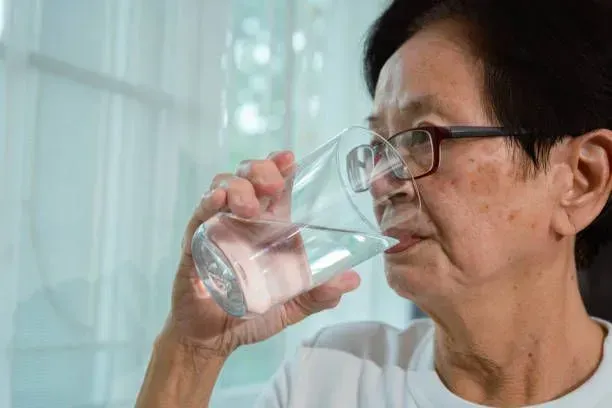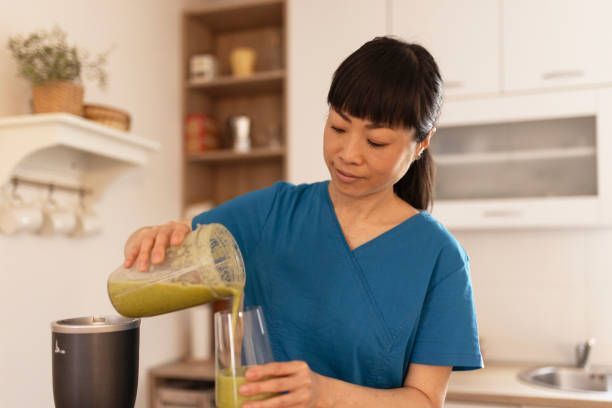Why Do Elderly People Get Dehydrated So Easily?
According to the British Nutrition Foundation "older people are vulnerable to dehydration due to physiological changes in the ageing process, but this can be complicated by many disease states, and mental and physical frailty that can further increase risk of dehydration.
Age-related changes include a reduced sensation of thirst, and this may be more pronounced in those with Alzheimer’s disease or in those that have suffered a stroke. This indicates that thirst in older people may not be relied on as an indicator of dehydration. Reduced renal function is also a risk factor. The kidneys play a vital role in fluid regulation but their function deteriorates with age, and the hormonal response to dehydration (which is key to fluid balance) may be impaired.
Dehydration is more common in those with cognitive impairment and changes in functional ability. Swallowing difficulties, dementia and poorly controlled diabetes are more common in older people and are all associated with poor hydration. Preventable dehydration in care settings, whether residential or hospitals is an indicator of poor quality care. And whist it may be preventable it would seem that it is still too common in the older person. Improving hydration can bring well-being and better quality of life for patients, allow reduced use of medication and prevent illness."

As we age, our bodies undergo various changes, and one aspect that requires special attention is hydration. Staying adequately hydrated is crucial for maintaining overall health and well-being, especially for seniors. At 7 Day Home Care, we understand the unique needs of the elderly and recognize the significance of addressing dehydration to ensure a higher quality of life. Frequently, after an assessment is done by our registered nursing staff, the care plan notes that hydration is an issue that needs to be closely monitored by our certified Home Health Aides.
Why Do the Elderly Become Dehydrated?
- Decreased Thirst Sensation: As individuals age, the sensation of thirst may diminish. This can lead to seniors not recognizing their body's need for water, resulting in insufficient fluid intake. The decreased thirst sensation in the elderly can be attributed to a combination of physiological changes associated with aging. As individuals grow older, there is a natural decline in the sensitivity of the thirst mechanism, which makes it more challenging for seniors to recognize and respond to their body's signals for fluid intake. Additionally, age-related alterations in hormonal regulation, particularly the antidiuretic hormone, may contribute to a reduced perception of thirst. This diminished sensitivity to dehydration cues can lead to insufficient fluid consumption, making it imperative for caregivers, healthcare professionals, and family members to actively encourage and monitor the hydration status of the elderly to safeguard their overall well-being.
- Medication Side Effects: Medication side effects can contribute significantly to dehydration in the elderly due to their potential diuretic properties and impact on fluid balance. Many medications commonly prescribed to seniors, such as diuretics, antihypertensives, and certain medications for chronic conditions, can lead to increased urine production and subsequent fluid loss. These pharmaceuticals may interfere with the body's ability to retain water, exacerbating the risk of dehydration. Additionally, medications that cause diarrhea or vomiting as side effects can further accelerate fluid loss, posing a dual challenge for maintaining adequate hydration. Caregivers and healthcare providers must remain vigilant in monitoring medication regimens for potential dehydrating effects, adjusting fluid intake as needed to mitigate the risk of dehydration-related complications in the elderly.
- Reduced Kidney Function: Reduced kidney function in the elderly plays a pivotal role in the increased susceptibility to dehydration. As individuals age, there is a natural decline in renal function, marked by a decrease in the efficiency of the kidneys to filter and conserve water. The ability to concentrate urine diminishes, leading to an impaired capacity to retain essential fluids. This decline in renal function can result in an increased frequency of urination and a reduced ability to conserve electrolytes, making the elderly more prone to fluid imbalance and dehydration. Consequently, individuals with compromised kidney function may require closer monitoring of their hydration status, and adjustments to fluid intake become crucial to ensure that the aging population maintains adequate hydration levels for overall health and well-being.
- Mobility Issues: Mobility issues among the elderly can significantly contribute to dehydration as limited physical movement may hinder access to hydration sources. Seniors facing challenges in mobility may find it difficult to independently fetch a glass of water or access water dispensers, leading to decreased fluid intake. Reduced mobility may also discourage individuals from making frequent trips to the kitchen or other areas where water is readily available. Furthermore, the physical effort required to move, especially for those with mobility issues, might be perceived as burdensome, potentially leading to unintentional neglect of hydration needs. Caregivers and support systems play a crucial role in addressing this issue by ensuring that hydration is made more accessible, either through strategically placed water stations or assistance in reaching water sources, ultimately promoting the well-being of the elderly and mitigating the risk of dehydration.
How Much Water Should Seniors Drink Each Day?
Determining the ideal daily water intake for seniors can vary based on factors such as age, health conditions, and activity levels. The Cleveland Clinic explains "water may not be the most exciting beverage in a world of iced mocha cappuccinos and matcha teas, but you literally can’t live without it. So how much water should you drink a day? Well, let’s dive into some numbers. The National Academies of Science, Engineering and Medicine recommends the following for daily fluid intake:
- 125 ounces (3.7 liters) for men.
- 91 ounces (2.7 liters) for women.
Here’s the thing, though: Consider those numbers a starting point."
“Your size, metabolism, location, diet, physical activity and health all factor into how much water you need,” says preventive medicine specialist Roxanne B. Sukol, MD.
Signs of Dehydration:
- Dry Mouth and Thirst: The most obvious signs of dehydration include a dry mouth and an increased sensation of thirst. Encouraging regular sips of water throughout the day can help alleviate these symptoms.
- Dark Urine: Dark yellow urine is an indicator of concentrated urine, suggesting dehydration. Monitoring urine color can provide valuable insights into hydration status.
- Fatigue and Weakness: Dehydration can lead to fatigue and weakness, impacting overall energy levels. Proper hydration supports optimal bodily functions and helps combat feelings of lethargy.
- Less frequent urination: Less frequent urination is a sign of dehydration because the body conserves water by reducing urine production in an attempt to maintain fluid balance, indicating a potential lack of adequate hydration.
- Confusion and dizziness: Confusion and dizziness are signs of dehydration as insufficient fluid levels can compromise blood flow to the brain, leading to decreased cognitive function and impaired balance.
- Headaches: Headaches can be a sign of dehydration because the brain temporarily contracts due to the loss of fluid, causing it to pull away from the skull and resulting in discomfort.
- Muscle cramps: Dehydration disrupts electrolytes crucial for muscle function, leading to involuntary contractions and painful cramps.
- Sunken eyes: Dehydration depletes vital fluids around the eyes, causing them to recede into their sockets and creating a characteristic "sunken" appearance.
Consequences of Chronic Dehydration:
- Kidney Damage: Prolonged dehydration can strain the kidneys, potentially leading to kidney stones or other complications. Maintaining adequate fluid levels is crucial for supporting kidney health.
- Cognitive Decline: Dehydration has been linked to cognitive decline in the elderly. Staying hydrated is essential for maintaining cognitive function and preventing conditions like confusion and disorientation.
- Increased Fall Risk: Dehydration can contribute to dizziness and lightheadedness, increasing the risk of falls among seniors. Hydration plays a key role in maintaining balance and stability.
- Urinary tract infections (UTIs): Dehydration can lead to urinary tract infections by reducing urine production and concentration, diminishing the flushing effect that helps eliminate bacteria from the urinary tract.
- Constipation: Dehydration can cause constipation as insufficient fluid intake leads to reduced water content in the stool, making it harder and more difficult to pass through the digestive system.
- Increased risk of hospitalization: Dehydration complications like UTIs, falls, and worsened chronic conditions can necessitate hospital care for seniors.
At 7 Day Home Care, we prioritize the health and well-being of our elderly clients. Recognizing the factors that contribute to dehydration and implementing strategies to address them is crucial for promoting a healthier and more fulfilling life for seniors. By understanding the signs of dehydration, encouraging adequate water intake, and addressing potential obstacles to hydration, we can collectively work towards ensuring that our elderly loved ones thrive in their golden years. To learn more about our in-home health care services in Manhattan, Queens, Brooklyn, Nassau County, and Suffolk County, New York, please call 516-408-0034 or visit us here.
Brian Callahan
7 Day Home Care










